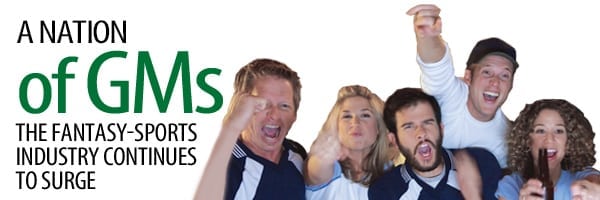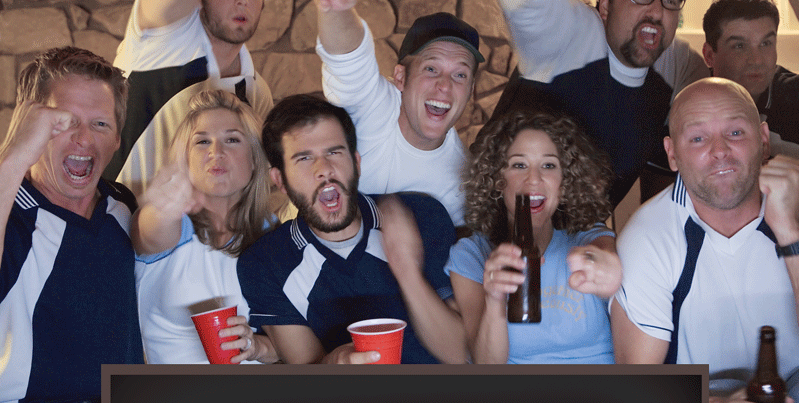
The Fantasy-sports Industry Continues to Surge
A Nation of GMs

Fantasy sports — born decades ago as a niche pastime for baseball überfans who tracked statistics by hand with calculators — has since exploded into an instant-data industry that claims more than 56 million participants. Most of those drafted their football teams last week in anticipation of the season, while others will put up money to redraft each week on sites like FanDuel and DraftKings. One thing is for sure: whether for fun or profit, the fantasy world has changed the way people watch sports — and the leagues, networks, and advertisers couldn’t be happier.
Before Mark McDonald jumped into fantasy football, he’d watch the Patriots on Sunday, and not much else. But now?
“It has dramatically changed my viewing habits,” said McDonald, a professor of Sport Management at UMass Amherst. “Games between horrible teams, games that once meant nothing to me, now I want to watch to see how my fantasy team is doing. I like that sense of control — I’m the general manager, controlling my own team, and watching other players to see who I might pick up. It changes your view of football. Even Thursday nights are must-watch.”
McDonald started playing GM four years ago when fellow faculty members at the Isenberg School of Management invited him into their league. He’s been hooked ever since, and was preparing for drafts in two different leagues the week he spoke with BusinessWest.
He’s not alone. The number of people participating in fantasy sports — football, baseball, basketball, hockey, even golf and auto racing — is expected to reach 56.8 million this year, a staggering increase of 37% from 2013, according to the Fantasy Sports Trade Assoc. (FSTA).
The vast majority play in season-long leagues, going head to head with a different team’s owner each week. But, increasingly, ‘daily’ fantasy sports, played for real money — FanDuel and DraftKings are the two giants of this industry — are becoming more popular. At the end of 2014, the two online services posted a combined $920 million in entry fees from 1.3 million paying users — numbers this year’s participation is expected to far surpass.
“It gives fans another connection point,” said Janet Fink, another UMass professor and chair of the Department of Sport Management. “Fantasy football is much more widely popular than any other fantasy sport, but they’re all growing. And now you have these day-to-day, week-to-week leagues getting more popular as well.”
Indeed, fantasy sports has come a long way from its 1970s origins, when hardcore baseball players played something called Rotisserie, drafting players at the start of the season, then tracking their statistics, by hand and with calculators, and translating those stats into a scoring system. Today, the data is instantaneous, meaning owners can sit on the couch with a smartphone and watch the points roll in.
And, by the tens of millions, that’s exactly what they do.
Fan Fare
Andrew Zimbalist, a professor of Economics at Smith College and one of the world’s foremost sports economists, has observed the impact of fantasy sports on American life, which goes well beyond that annoying guy in the lunchroom on Tuesday complaining about losing by a point because Julio Jones dropped an easy touchdown Monday night.
“It’s something that increases the avidity of fandom and, in some cases, extends fandom,” he explained. “People who are involved in fantasy sports are paying much more attention to the game. They subscribe to more online services and satellite services.
“The other effect they have, to some degree — and it differs by sport — is more generalized fandom,” he went on. “If I’m a Red Sox fan living in Massachusetts, without the fantasy-sports component, I’m following the 25 people on the active Red Sox roster. But if I have Mike Trout in my fantasy-baseball league, if I’ve got Joe Mauer on my team, I’m not only into the Red Sox games, but Angels games and Twins games, etc.”
That sort of changed behavior is something sought after and prized by professional sports leagues, Zimbalist added.
“Football, for a variety of reasons, has long been a national sport; even though fans have a team they follow and support, true football fans will watch two games, and might stay around for Sunday evening,” he explained. “But in the other leagues, like baseball — say you’re a Padres fan living in San Diego. You’re going to watch the Padres games; you’re not going to watch the Giants or Diamondbacks. But some of the fandom becomes nationalized when you have fantasy sports leagues. That is a very valuable component — and it’s a growing fandom.”
No wonder, then, that ESPN hosts the most popular fantasy platform (Yahoo! is the second-largest), while DraftKings recently secured $300 million in funding from Fox Sports, Major League Baseball, the National Hockey League, and Major League Soccer. In return, the company plans to give away $1 billion in prizes this year, more than triple the $300 million it awarded in 2014.
Meanwhile, the larger play-for-cash entity, FanDuel, which pays out more than $10 million in prizes every week, recently raised $275 million from investors, including affiliates of Google, Comcast, and Time Warner.
“Research has been done asking whether, if people got too much into fantasy sports, it might decrease their interest in their own team,” Fink said. “In fact, they found quite the opposite. People around here still root for the Patriots, but they flip to the Red Zone to check out their fantasy team. That way, the viewership of games league-wide increases. There’s extra incentive to watch the Chargers versus the Raiders when you wouldn’t do that normally.”McDonald is familiar with DirecTV’s Red Zone channel, which jumps, all Sunday long, between teams on the cusp of scoring — a fantasy maven’s dream. He noted that his league’s owners get together twice a year for Sunday viewing parties, but they don’t watch the Patriots; they watch Red Zone. “One aspect to fantasy that’s a bit negative is how it impacts viewing your favorite team.”
Fink has read studies showing that, while some fantasy hobbyists remain more interested in their home-state team, others come to identify more with their fantasy players and seek them out on TV instead. “But in most cases,” she added, “it’s probably a very complementary relationship.”
Speaking of relationships, McDonald believes fantasy football has strengthened connections between the people he works with at Isenberg.
“As with any business school, we have a bunch of different departments — accounting, finance, management, marketing … seven or eight in all. There are faculty members I might not otherwise interact with, and now, if I run into the owner I’m playing against that week, we’ll get some friendly trash talking going on in the hallway. You get to know each other. We find ways to get together now.”Real Money
Advertisers covet the fantasy-sports market, according to the FSTA, which reports that team owners are mostly college-educated with an average household income topping $75,000. At last measure, 66% of participants were male, and 34% female, but those figures have been steadily moving toward each other in recent years.
However, the daily and weekly games at FanDuel and DraftKings remain almost exclusively the domain of men. Meanwhile, a survey of more than 1,400 players by Eilers Research found that more than 40% of these players have reduced the amount of time they devoted to traditional fantasy leagues.
“Everyone I know is pretty much in it for season-long fun, low-stakes games. But I am concerned that our students are increasingly drawn to that world,” McDonald said of the high-risk sites, saying they’re occupying a role that online poker recently dominated.
But — because of the obvious risk involved — is it legal? The Unlawful Internet Gambling Enforcement Act (UIGEA) of 2006, intended to regulate the financial institutions that act as the monetary link between gamblers and Internet casinos, seems to say yes.
While some states — Arizona, Iowa, Louisiana, Maryland, Montana, and Vermont — have enacted their own laws muddying the waters around this issue, the vast majority of states, including Massachusetts, have not.
That leaves the UIGEA as the go-to authority, and the federal law specifically does not regulate games in which “all winning outcomes reflect the relative knowledge and skill of the participants and are determined predominantly by accumulated statistical results of the performance of individuals (athletes, in the case of sports events) in multiple real-world sporting or other events.”
In other words, in the eyes of the law, fantasy sports are considered games of skill, not luck.
McDonald, again noting the excitement of a weekly draft, worries about their appeal and the potential for addiction and financial trouble, no matter how shrilly FanDuel and DraftKings shout about millions in winnings on their ubiquitous radio ads.
“It’s so exciting to redraft and select your team every week,” he told BusinessWest. “They may think the way we old guys play is slow and boring. If you have injuries early in the season, it can kill you. But with the weekly games at DraftKings and FanDuel, you get away from that, and every week is a new opportunity to make choices.
“But,” he went on, “people do put a lot of money at risk, and I think it’s addicting. It’s like crack to fantasy sports players. It’s a weekly high, and in a sport like baseball, it could be a daily high.”
For now, McDonald considers himself firmly in the camp of more than 55 million people who have become amateur GMs not for big payouts, but for the fun, the challenge, and the camaraderie.
“It’s a social thing that enhances the viewing experience,” he said. “For me, personally, putting money at risk would take some of the fun out of it; I think it would be very stressful.”
After all, trash talk is stressful enough.
Joseph Bednar can be reached at [email protected]







